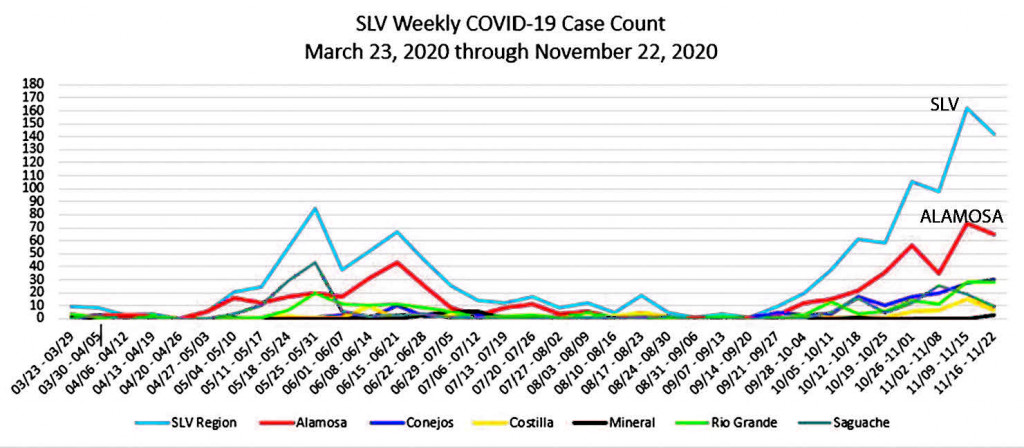1 in 49 Coloradoans currently COVID-19 infectious

SLV COVID-19 cases decrease slightly
SAN LUIS VALLEY – Nov. 23, The Colorado Department of Public Health and Environment (CDPHE) and the Colorado School of Public Health released a report that shows infections and hospitalizations are continuing to increase across the state. “The model estimates that currently one out of every 49 residents in the state is infected with SARS-CoV-2, by far the highest prevalence since the virus arrived in Colorado.” Governor Polis encouraged Colorado residents to stay at home for Thanksgiving and only interact with members of the same household unless visitors were able to self-isolate for 10-14 days prior to the holiday.
Nov. 17, San Luis Valley (SLV) positive known active cases grew by 99 from the previous week to 258 cases – an increase of 61.4%. Monday, Nov. 23 COVID-19 active cases decreased 11% to 230 with the two-week positivity rate dropping from 11.35% to 10.78%. Statewide the positivity rate dropped from 11.6% to 11% since over the past week.
Monday, Nov. 23, Rio Grande and Saguache counties remain at “level yellow” on the state’s COVID-19 dial. But Alamosa County is at “level red” and Conejos, Costilla and Mineral counties moved to “level orange” last week. For weeks, Mineral County had zero positive tests or active cases and was at “level blue” – the lowest level on the dial. But on Nov. 23, San Luis Valley Public Health Partnership announced that Mineral County had 12 active cases and that Mineral County had moved from level blue to level orange.
CDPHE reserves the right to move a county to a more restrictive level at any point, should circumstances warrant more aggressive restrictions. Where possible and reasonable, CDPHE officials see value in keeping SLV on one level, given that the health care system functions to serve the entire region, and the county residents frequently move between counties for work and other reasons.”
There were 230 known active cases in the SLV Nov. 23. “Active cases” means that the cases are confirmed positive for COVID-19 and are currently being supported by Public Health during their isolation period. Cases by county were as follows:
Alamosa: 118
Conejos: 29
Costilla: 10
Mineral: 12
Rio Grande: 54
Saguache: 9
According to the Johns Hopkins Coronavirus Resource Center on 23, Colorado continues to have a lower seven-day positivity moving average test rate of than its neighboring states with an 11% positivity rate. On Nov. 23 Kansas was at 33.3%, Wyoming 51.8%, Utah 18.9%, Arizona 18.7%, Nebraska 12.9% and Oklahoma 12.9%. The Colorado and World Health Organization two-week positivity goal is 5% or lower.
General guidelines for Level Orange are summarized below. There may be additional guidelines for specific sectors.
Mitigation Strategies:
General guidelines for Level Orange are summarized below (and with specific additional guidelines for specific sectors).
Public and private gatherings are limited to no more than 10 individuals from no more than 2 households.
Face Coverings. Face coverings are required for all individuals in public indoor settings unless the individual is 2 years of age or younger or cannot medically tolerate a face covering.
Capacity. Most businesses, offices, and places of worship that have been operating at 50% capacity will shift down to 25% of capacity, or 50 persons per room, whichever is less and while maintaining proper distancing.
Specific Areas impacted by this Level Orange include:
Capacity Restriction County-wide Parameters: To address Level Orange – Safer at Home High Risk
Personal Gathering Size: Up to 10 from no more than 2 households
P-12 Schools: In-person, hybrid or remote as appropriate
Higher Education: Remote or hybrid suggested, limited in person as appropriate, and other major strategies to increase social distancing
Places of worship and Life Rites:
Indoors Unseated Functions: 25% capacity or 50 (whichever is less)
Indoor seated Functions: 25%, 50 person capacity (whichever is less)
Outdoors: 6ft between parties outdoors, per local zoning
Restaurants:
Indoors: 25% capacity, 50 people (whichever is less)
Outdoors: 6 feet between parties outdoors, per local zoning
Non-Critical Manufacturing: 25% capacity or 50 people (whichever is less)
Offices: 25% capacity (Here, remote work is highly encouraged)
Bars: Closed
Gyms/Fitness: 25% capacity, 25 indoors, or outdoors in groups less than 10
Group sports and Camps: Virtual, or outdoors in groups less than 10
Retail: 25% capacity
Personal services: 25% capacity or 25 people (whichever is less)
Limited Health Care Settings: 25% capacity or 25 people (whichever is less)
Events:
Indoor Unseated: 25%, 50 person capacity (whichever is less)
Indoor Seated: 25%, 50 person capacity (6ft distancing between parties)
Outdoor Unseated: 25%, 75 person capacity (whichever is less)
Outdoor Seated: 25%, 75 person capacity (6ft distancing between parties)
Outdoor Guided Services 25% capacity or 10 people
A partial list of things that will change in moving from Orange to Red are these:
Retail critical and noncritical open to 50% of capacity with curbside pickup and dedicated senior and high risk hours.
No personal gatherings
Places of worship and life rites: For indoor events, 25% capacity or 50 persons, whichever is fewer, with distancing. 6 feet of distance between parties outdoors.
Restaurants: Indoor dining closed. Takeout, curbside, delivery or to go. Outdoor dining with groups of own household open.
Offices may operate at 10% capacity, with remote work preferred.
Gyms may operate at 10% capacity with up to 10 persons per room, reservations required.
Indoor events and entertainment are closed.



